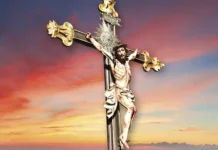Bidding farewell to His disciples in the Last Supper, Our Lord manifests to them the boundless love of His Sacred Heart, revealing to them how much He loves each one, not only as God and Redeemer, but also as a brother and friend.
Gospel for the 5th Sunday of Easter
1 Jesus said to His disciples: “Do not let your hearts be troubled. You have faith in God; have faith also in Me. 2 In my Father’s house there are many dwelling places. If there were not, would I have told you that I am going to prepare a place for you? 3 And if I go and prepare a place for you, I will come back again and take you to Myself, so that where I am you also may be. 4 Where I am going you know the way.” 5 Thomas said to Him, “Master, we do not know where You are going; how can we know the way?” 6 Jesus said to him, “I am the Way and the Truth and the Life. No one comes to the Father except through Me. 7 If you know Me, then you will also know my Father. From now on you do know Him and have seen Him.” 8 Philip said to Him, “Master, show us the Father, and that will be enough for us.” 9 Jesus said to him, “Have I been with you for so long a time and you still do not know Me, Philip? Whoever has seen Me has seen the Father. How can you say, ‘Show us the Father’? 10 Do you not believe that I am in the Father and the Father is in Me? The words that I speak to you I do not speak on my own. The Father who dwells in Me is doing His works. 11 Believe Me that I am in the Father and the Father is in Me, or else, believe because of the works themselves. 12 Amen, amen, I say to you, whoever believes in Me will do the works that I do, and will do greater ones than these, because I am going to the Father” (Jn 14:1-12).
I – The Evangelist Closest to Mary
As we read the Gospel of St. John, we should bear in mind that in it, the Beloved Disciple records not only remembrances of the years he spent with Jesus, but also of those lived close to Our Lady, from the moment he received Her as his Mother, at the foot of the Cross, and “took Her to his own home” (Jn 19:27), until the day of Her departure for Heaven.
This singular intimacy with the Blessed Virgin, which no other Apostle enjoyed, gave St. John innumerable opportunities for conversations with the Queen of Angels and men, the Theologian par excellence, and endowed with infused knowledge and a sublime comprehension of her Divine Son. Thus, besides remembering perfectly the scenes he witnessed, as well as the words spoken by Our Lord, this Evangelist penetrated into the deepest meaning of the episodes narrated, thanks to the teachings he received from Mary.
No other Apostle enjoyed so many conversations with the Blessed Virgin Mary, the Theologian par excellence
Because he wrote his testimony at a time marked by controversy with the Gnostics, who contested the divinity of Christ, St. John strove to demonstrate the union between the divine and human nature in the Second Person of the Blessed Trinity, citing facts and affirmations of Jesus that effectively establish this theological truth. The passage selected for the Liturgy of the 5th Sunday of Easter contains revelations so lofty in this regard that neither human nor even angelic intelligence could ever fathom them by effort alone.
II – A Sublime Manifestation of Affection for His Chosen Ones
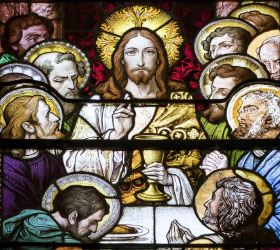
At the Last Supper, soon after the traitor’s departure, Our Lord Jesus Christ announced to His disciples His imminent glorification and warned them: “Little children, yet a little while I am with you” (Jn 13:33). It can be supposed that such a prospect caused uneasiness in those who followed Him closely, hearing Him daily and seeing Him perform countless wonders: what would life be like without Him, without His preaching and miracles?
Desirous of reassuring them, Jesus began to offer beautiful considerations, manifesting the unsurpassable affection which, coming from the depths of His Sacred Heart, flowed out upon those chosen souls.
Faith and serenity, correlated virtues
1 Jesus said to His disciples: “Do not let your hearts be troubled. You have faith in God; have faith also in Me.”
The feeling of instability, anguish and anxiety that afflicts human beings often does not depend on will or personal inclinations. Therefore, no one has such absolute control over his own heart as to prevent it from being troubled. How, then, can we understand this admonition from Our Lord?
The answer is found in the subsequent sentence, which indicates a close correlation between the virtue of faith and serenity of spirit. St. Teresa of Avila recalls it in her famous verse: “Let nothing trouble you, nothing frighten you; everything passes, God does not change. Patience attains everything; to those who have God, nothing is lacking: God alone is enough.”1 In fact, if we lived in this perspective, aware that everything is in the Lord’s hands and nothing happens contrary to His will or permission, insecurity would never invade our hearts, robbing us of peace.
“Let nothing trouble you, nothing frighten you, everything passes… To those who have God, nothing is lacking”
Let us consider, moreover, that Jesus, as God, loves His disciples with infinite love. His concern for the salvation of all of them is much greater than each one’s own desire to reach Heaven; and, as man, His affection for them shows itself to be far superior than that of the most devoted mother in relation to her only son. Endowed with a perfect instinct of sociability, the Redeemer is willing to help His beloved ones and to furnish them with every privilege. For this reason, He bids them: “Have faith also in Me.”
A Gothic arch of love
2 “In my Father’s house there are many dwelling places. If there were not, would I have told you that I am going to prepare a place for you? 3 And if I go and prepare a place for you, I will come back again and take you to Myself, so that where I am you also may be.”
Very logical and attentive to his doctrinal objective, the Evangelist registers these words in order to highlight the circuit of love that exists in the Sacred Heart of Jesus: divine love, which created the Apostles and infuses in them the good, and human love, by which He delights in this same good present in each one. Thus, there is in Christ a kind of Gothic arch of intense love for these men who are His creatures, His children and His brothers.
In instructing them, Our Lord wishes to express His affection: being the Second Person of the Blessed Trinity, from all eternity He has reserved an abode for each one; now, having become incarnate, He wishes to go to the Father’s house to embellish these mansions and lead them there. Although the Church has not officially declared anything about the heavenly Jerusalem as a concrete and determinate site,2 we can conjecture that the places the Divine Master mentions are not just symbols of a state of soul, but in fact specific thrones, non-transferable and proportionate to the vocation of the Blessed who after the resurrection will occupy them forever, in their glorious bodies.
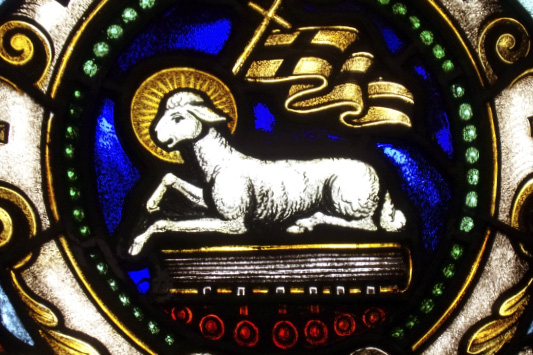
How beautiful it is for us to reflect that the Most High built the city whose “lamp is the Lamb” (Rv 21:23), in such a way that the Redeemer could add new marvels to it and, upon receiving these chosen ones, say to them: “My son, my brother, my disciple, in the name of the friendship established between us when we lived on earth, I have obtained more graces and merits for you and have enhanced your place here. This is the palace that I offer you as a sign of my consideration and esteem!” If we, conceived in original sin, are concerned with giving a proper welcome to others, with a view to their comfort and satisfaction, how much more the God-Man, capable of unimaginable extremes of goodness!
Remedy and life for body and soul
4 “Where I am going you know the way.” 5 Thomas said to Him, “Master, we do not know where You are going; how can we know the way?” 6 Jesus said to him, “I am the Way and the Truth and the Life. No one comes to the Father except through Me.”
Believing that Our Lord alluded to some geographical place, St. Thomas presents this rather naive question, proper to his forthright and expansive character. He liked very precise explanations and did not hesitate to expose his doubt, giving the Divine Master the opportunity to explain one of the most comprehensive concepts regarding Himself. Such is the theological substance contained in His answer that to analyse it in depth would go well beyond the limits of this article. Thus, let us consider just one of the definitions contained in verse 6: “I am the Life.”
In fact, beginning on the natural plane, Jesus is “the Life” because He offers bodily health to those who seek a remedy for their ills in Him. There are numerous passages in the Gospel that show the most sacred humanity of the Redeemer as a vehicle to transmit physical vigour to the sick, as St. Luke summarizes: “For all the crowd sought to touch Him, for power came forth from Him and healed them all” (Lk 6:19). This happened, for example, to the deaf-mute freed from his impairment when Jesus placed His fingers on his ears and tongue (cf. Mk 7:32-35), and to the blind men of Jericho, who recovered their sight after He placed His sacred hands on their eyes (cf. Mt 20:29-34).
Our Lord fills souls with graces and gifts, draws them away from eternal death and revives them if they succumb to sin
Moreover, the Divine Physician presents Himself as Life when He awakens the deceased. With an order, He raised up the son of Nain’s widow and “gave him to his mother” (Lk 7:15). He acted in a similar manner with Jairus’ daughter, taking the girl’s hand and commanding her to rise (cf. Mk 5:35-43), as well as with Lazarus, whom He summoned from the tomb after being dead for four days (cf. Jn 11:1-44).
Nevertheless, the supernatural life granted by Our Lord to souls is much more exuberant: He fills them with graces and gifts, draws them away from eternal death and revives them if they succumb to sin. This is how the Good Jesus acted with all who sought Him, repentant, like the sinner who washed His feet in Simon’s house: “Your sins are forgiven. […] Your faith has saved you; go in peace” (Lk 7:48, 50). These words mean: “Grace, My divine life, has penetrated into you!”
Worthy of note is what happened to St. Peter after having denied the Divine Master three times. When the cock crowed, Jesus’ gaze rested upon this Apostle (cf. Lk 22:61), restoring to him supernatural life – which he had certainly lost – with a vigour far superior to that which animated him before sin.
A mysterious affirmation
7 “If you know Me, then you will also know my Father. From now on you do know Him and have seen Him.”
The essence of Our Lord’s declaration is found in the verb “to know”. At first sight these seem to be two paradoxical sentences, for He makes a conditional statement, “If you know Me, then you will also know my Father,” and then He presents it as a fait accompli: “From now on you do know Him and have seen Him.”
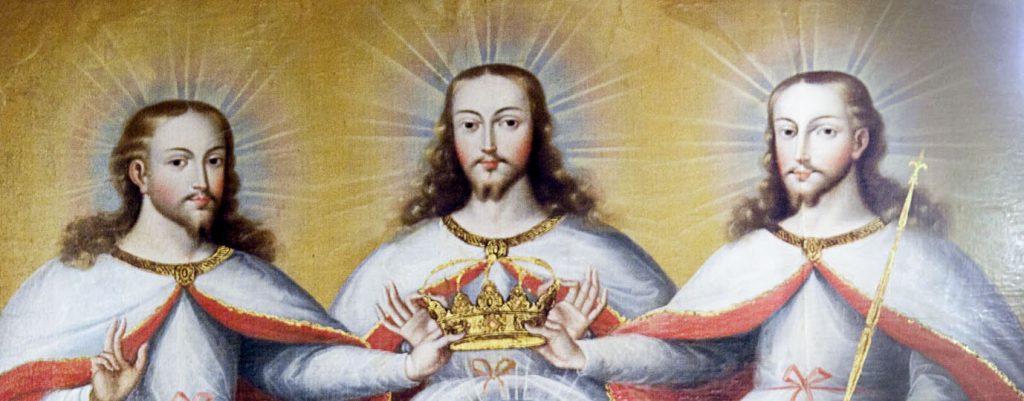
A superficial analysis of this verse would lead us to judge that Jesus refers to the most elementary aspect of the doctrine on the Blessed Trinity: three distinct but identical Persons in one God. From this it would be easy to conclude that whoever sees Our Lord Jesus Christ sees what the Father or the Holy Spirit would be like if They were to take on flesh.
However, the Apostles realized that there was a deeper meaning in these words. Eager to penetrate this mystery, St. Philip is the first to speak.
A request born of enthusiasm
8Philip said to Him, “Master, show us the Father, and that will be enough for us.” 9Jesus said to him, “Have I been with you for so long a time and you still do not know Me, Philip? Whoever has seen Me has seen the Father. How can you say, ‘Show us the Father’?”
For some authors, St. Philip’s supplication stems from a desire to urge the Divine Master to perform a miracle by which the Father would manifest Himself in a grandiose way to them, perhaps as He had done with Moses on Mount Sinai (cf. Ex 19:16-24). However, if we analyse the Apostle’s request from another perspective, we can interpret it in a very different way.
This “knowing the Father” implies having faith, loving, and we could almost say “sensing” who the Son is
Those who progress in the spiritual life, climbing the increasingly sublime rungs of perfection one by one, begin at a certain point to have such a longing to see God face to face that they give little importance to all else, even death itself, in order to reach full union with Him.
This phenomenon takes place with Philip. He had reached a peak of enthusiasm, admiration and affection for Our Lord Jesus Christ, and for this reason he thinks: “If the Son is like this, what must the Father be like? Lord, show me the Father et cætera tolle – and take away the rest!”
The first words of Jesus’ response make it clear that this “knowing the Father” implies having faith, loving, and we could almost say “sensing” who the Son is, because He calls Philip’s attention precisely to the three years that He has shared with them, and not to some abstract teaching or principle.
“I am in the Father and the Father is in Me”
10 “Do you not believe that I am in the Father and the Father is in Me? The words that I speak to you I do not speak on my own. The Father who dwells in Me is doing His works.11a Believe Me that I am in the Father and the Father is in Me…”
By using the verb “to believe,” Our Lord shows that it is a truth that requires the concurrence of faith, because the intelligence is incapable of assimilating it. And then He reveals the deepest meaning of His words: he who sees the Son sees the Father, because one dwells in the other.
Regarding the intimate relations of the Blessed Trinity, He explains to us the theology that from all eternity the Father knows Himself entirely, begetting another Person, the Son. The latter, also called the Word, is the perfect expression of the Father, without any addition or diminution. Looking upon and loving one another, a Third Person proceeds from Them, identical to both: the Holy Spirit. Therefore, the Son is in the Father and the Father is in the Son by knowledge and, above all, by love.
With the Incarnation of the Word, one more factor is added to the dwelling of one within the other: obedience. By assuming human nature, the Son made Himself obedient to the Father (cf. Phil 2:8), and it is in this sense that we must understand what Jesus declares about the words that come from His sacred lips: He does not say them by Himself as Man, but, on account of His obedience, it is the Father who lives and acts in Him.
11b “… or else, believe because of the works themselves. 12 Amen, amen, I say to you, whoever believes in Me will do the works that I do, and will do greater ones than these, because I am going to the Father.”
It is fitting to note that Our Lord mentions His works as a secondary element, useful for convincing those who, due to a lack of enthusiasm, doubt His divinity. Just as those who have broken a foot need support to walk, to those who do not want to soar along the horizons of faith, He offers the “crutch” called reason: “Look at My works. Is it possible for a common man to walk on water, to multiply loaves and fish, and to raise the dead? At least lean on that crutch and forge ahead!”
To those who do not want to soar along the horizons of faith, He offers the “crutch” called reason
The promise contained in the final verse embraces all members of the Church, founded by Him on earth before departing “to the Father.” Their works will be even “greater ones”, provided they have faith in Him. Thus, if someone believes himself incapable of carrying out an apostolic project, he should not ask himself if he has natural abilities or experience, but rather if he believes in Our Lord’s omnipotence. All efforts will be futile in the absence of such faith, as He Himself taught: “apart from Me you can do nothing” (Jn 15:5).
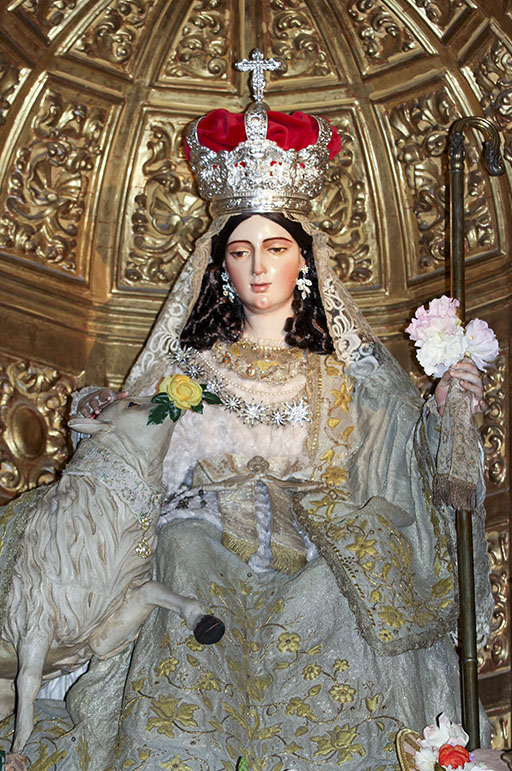
III – Through Faith in the Love We Receive, We Will Accomplish Wonders
The Gospel for this 5th Sunday of Easter calls us to unshakeable confidence in Jesus’ love for us, capable of establishing order and tranquillity in our hearts, and dispelling all anxiety.
If our faith in Him is robust, our intelligence will broaden, our love will be strengthened and we will live in obedience to God and with the willingness to serve Him unto immolation. If, above all, our soul is pervaded with enthusiasm, the Father, the Son and the Holy Spirit will be present in us, and then we will be able to say as St. Paul did: “it is no longer I who live, but Christ who lives in me” (Gal 2:20).
Providence wanted to reserve special and unprecedented graces for this period of history in which we were born. Despite our weaknesses and shortcomings, God will use us as instruments to accomplish His wonders, and we must be aware of this. If we fear the idea of being just a few, as compared with the whole world that turns its back on Him, let us remember that the effectiveness of our action is not a question of numbers, but of conviction in the power of the Father. This was Our Lady’s attitude when She pronounced the words that gave humanity a new direction: “let it be to me according to your word” (Lk 1:38).
Providence wanted to reserve special and unprecedented graces for this period of history in which we were born
Let us believe in the imminent triumph of Mary Most Holy, the “open door, which no one is able to shut” (Rv 3:8), who will give access to the historical era in which all nations will recognize Our Lord Jesus Christ as the Way, the Truth and the Life. ◊
Notas
1 ST. TERESA OF JESUS. Poesia IX. In: Obras Completas. 2.ed. São Paulo: Edições Carmelitanas; Loyola, 2002, p.980.
2 Cf. ROYO MARIN, OP, Antonio. Teología de la salvación. 4.ed. Madrid: BAC, 1997, p.445-446.




